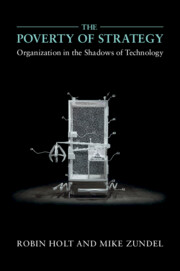Book contents
- The Poverty of Strategy
- The Poverty of Strategy
- Copyright page
- Dedication
- Epigraph
- Contents
- Figures
- Table
- Acknowledgements
- Introduction: Strategy as the Basic Question of Organization?
- Part I Authenticity
- 1 Strategy and the Organization of Authenticity in the Polis
- 2 Can the Strategoi Ever Build a Polis?
- 3 Strategy in the Lifeworld, and the Problem with Home
- Part II The Three Epochs of Strategy
- Part III The Open
- Index
3 - Strategy in the Lifeworld, and the Problem with Home
from Part I - Authenticity
Published online by Cambridge University Press: 14 July 2023
- The Poverty of Strategy
- The Poverty of Strategy
- Copyright page
- Dedication
- Epigraph
- Contents
- Figures
- Table
- Acknowledgements
- Introduction: Strategy as the Basic Question of Organization?
- Part I Authenticity
- 1 Strategy and the Organization of Authenticity in the Polis
- 2 Can the Strategoi Ever Build a Polis?
- 3 Strategy in the Lifeworld, and the Problem with Home
- Part II The Three Epochs of Strategy
- Part III The Open
- Index
Summary
Chapter 3 plays out a philosophical engagement with organization and technology following Martin Heidegger’s well-known association of industrialization with technological enframing in which the question of self-knowing had been thoroughly and perhaps irredeemably concealed. Were it possible to ask such a question, then Heidegger identifies an essential un-at-homeness to the being (Dasein) able to question its condition of being, its ‘thereness’, thereby setting in play an uncanny condition of being able, in principle (qua being human), to dis-conceal one’s essence, and yet continually falling short of ever doing so. It is this uneasy revealing that sets the scene for our investigation of the self in its environment. It is because of his essentialized association of technology, industrialization and the concealing of being that Heidegger equates the possibility of its being unconcealed with a political movement that pushes back at the global order, and restores a more archaic, human-centred version. The profound and horrific irony being that it was in totalitarian national socialism that he found such a movement, an enduring affiliation that has been unmoored in detail in his Black Notebooks.
- Type
- Chapter
- Information
- The Poverty of StrategyOrganization in the Shadows of Technology, pp. 81 - 122Publisher: Cambridge University PressPrint publication year: 2023

